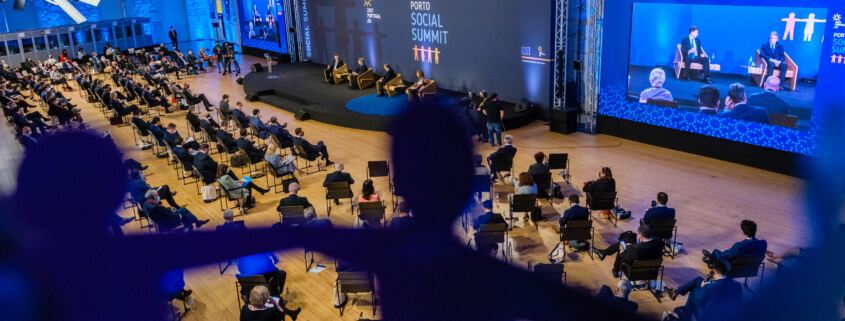Europe and its citizens will have to shape together the journey to the future of social Europe started in Porto
On the occasion of Europe Day and the launch of the Conference on the Future of Europe, CEC President Ludger Ramme shares his view on the future of social Europe after Porto.
The Summit of Porto that I have attended as my last engagement as President for CEC European Managers after 25 years on the board was for some aspects a “foretaste” of what the new normal might look like. The “normality” of physical gatherings, coffee breaks and human interaction mediated by the complex protocol of social distancing. I would like to congratulate Prime Minister Costa and the government of Portugal for being so courageous to gather a meeting in presence and give us hope that the pandemic will be under control in the course of this year.
The content of our debate too, was projected into the future, discussing how to progress towards the achievement of a true Social Europe that leaves nobody behind. The Summit came as the ideal “conclusion” of the process of defining the content of a Pillar of Social Rights for the EU, started in the Summit of Gothenburg four years ago.
As the Porto Declaration mentions, implementing the Pillar endorsed during the Summit rests on the cooperation of different actors at European, national and local level. It is the right interpretation of that subsidiarity principle whose respect is fundamental in the complex EU institutional setting. If one had to choose the word that epitomizes Europe, that would be in my opinion respect. Respect of the differences, respect of competences, respect of national specificities. Like in other domains, the development of the European social dimension is a process that cannot respond to a “wishful” approach but must be anchored in the reality of the many differences among EU countries.
Yet, advancing on the social dimension of Europe is a necessity, and Europeans have clearly expressed this wish.
For too long the horizon of the European integration has been perceived as too narrow and top-driven, thinking too big on small things and rather vaguely on more important, topical issues. The pandemic has redefined people’s perception about priorities and how to deliver on them. The exercise launched with the Conference on the Future of Europe (starting on this Europe Day) identifies precise mechanisms to allow for the participation of the European people in this reflection process. This can be a powerful antidote to the risk that the European institutional domain is perceived as a separate apparatus, speaking a language that is difficult to understand and seemingly very far from the everyday reality. But without an inclusive and meaningful involvement of civil society (and its representatives), this opportunity will become another Euro-centric exercise fueling incomprehension and betrayed expectations.
This is not populism, but a simple consideration: we need to make Europe more understandable, more present and more tangible in its outcomes.
The difficult times we are experiencing have – for one positive aspect – helped us identify a few major challenges that can unite us all – generationally, geographically, socially and economically: the transition to a sustainable tomorrow, the creation of a social protection system that is fair and accessible to all, a digital ecosystem that serves our societal needs, the guarantee of truly inclusive and respectful societies. It is on these fields that Europe has to deliver effectively but realistically. The meter of its success will be the capacity of its action to impact concretely people’s lives.
As Europe seems on the good track to leaving the health emergency behind, the timing is right to reflect on where it wants to go in the future decades, and how it wants to reach its destination.
May the journey that started in Porto and everywhere else in the EU on Europe Day be a successful one. For our generation and those to come.
Leaving my functions to dedicated younger colleagues fills me with gratitude and optimism. As a leader you are always responsible for failure or mischief but never deserving achievements all by yourself. Success is made possible entirely by good teams working hand in hand. I had the privilege to work with good teams only and that is the key to what we together could achieve.




